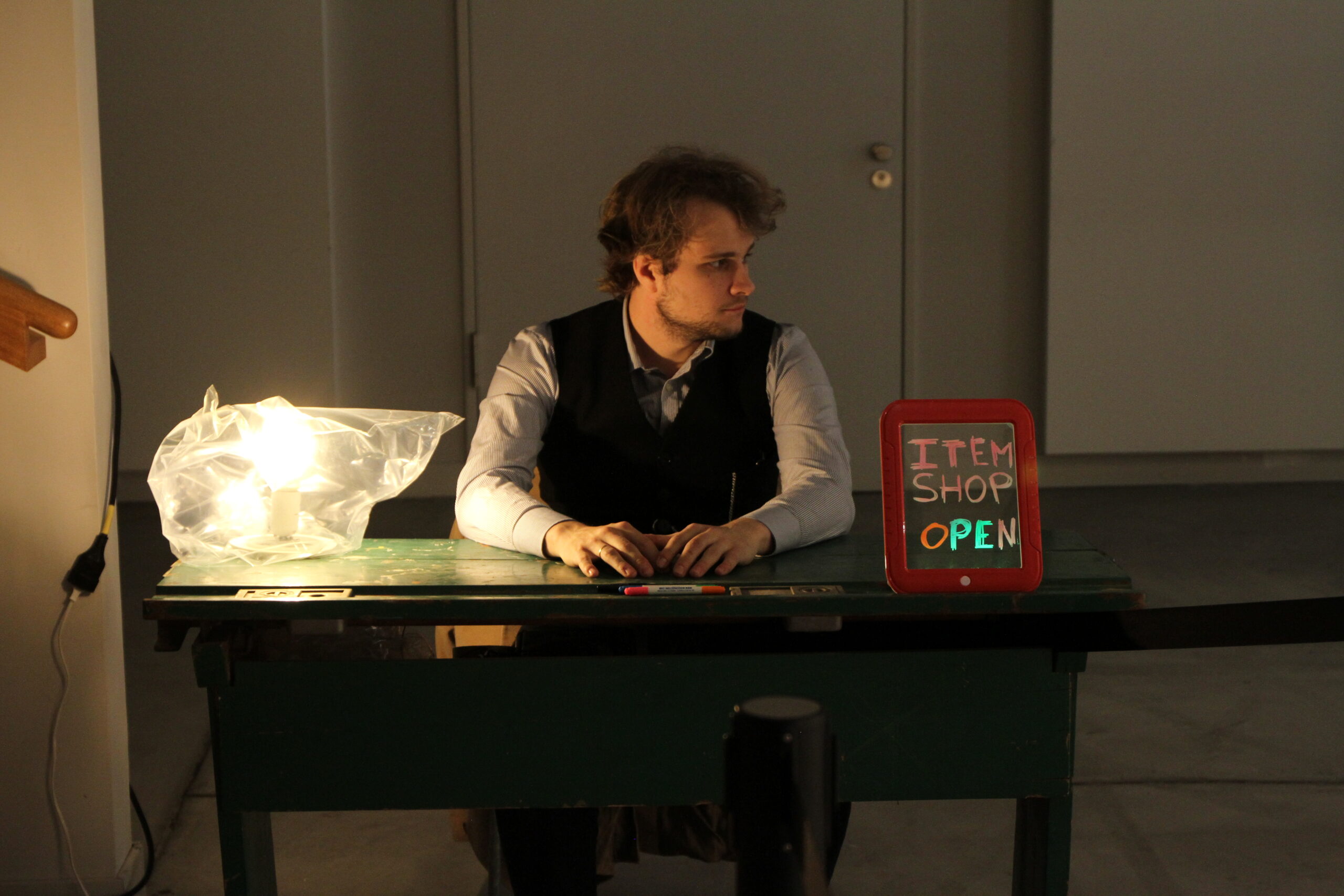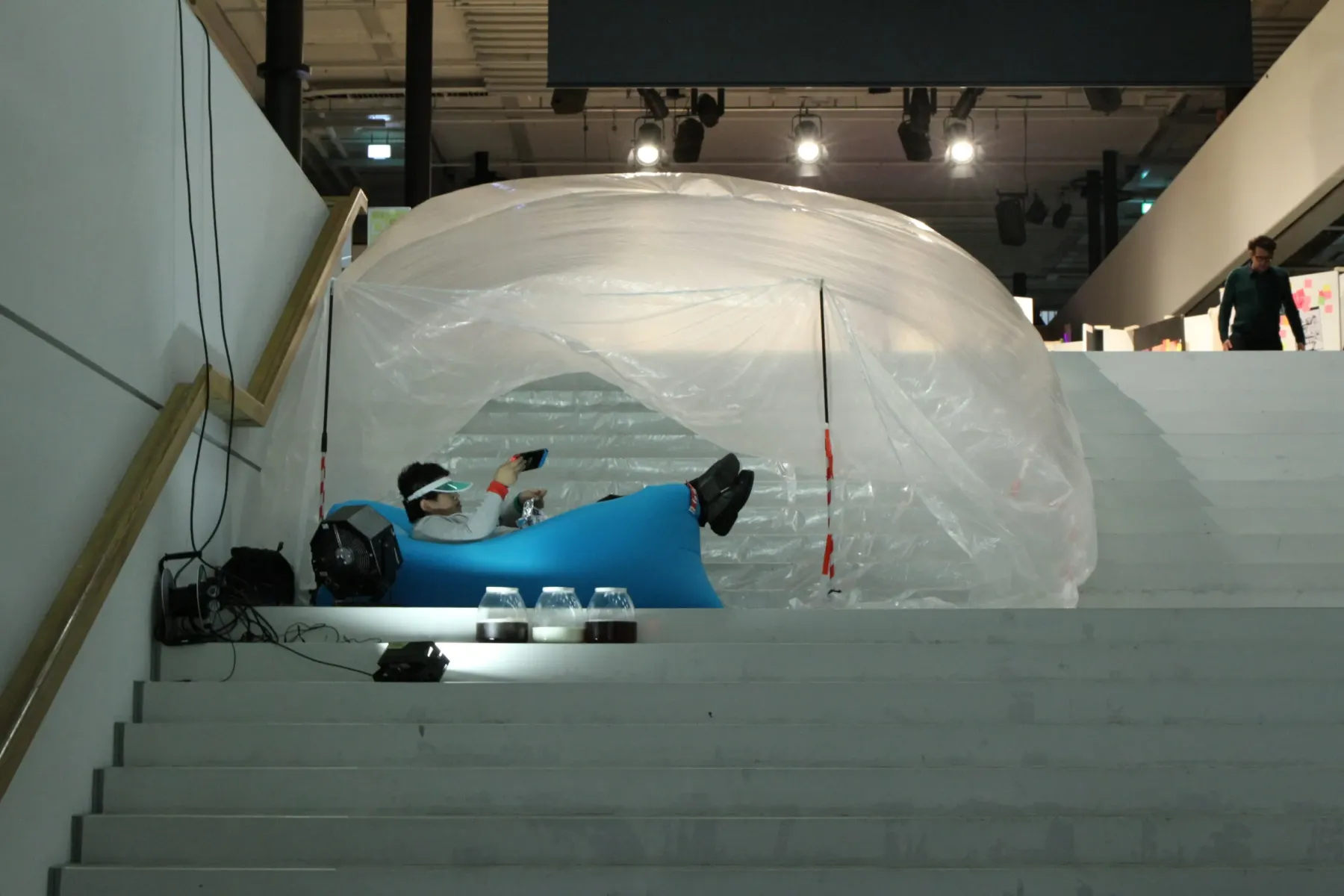Concept
Welcome to the Item Shop is a three part performance installation. It deals with our own take on how to change the world in a society where the changing of the world is ever present. As we are all equipped with privileges we sometimes don’t realize we have, Welcome to the Item Shop makes them visible.
A little roofless hut – so the audience was able to peak inside from the 6th floor – on the stairs of the Kaskadenhalle with painted black walls outside forms one part of the performance. In contrast to the outside look, inside unfolds a hyperreality: white walls, flashing LED lights, mirrored panels and over jammed shelves with objects in blown up plastic bags. Old and broken, useless massively big objects. The plastic bags as a reference to the goldfishes in Hong Kong and to mirror and exaggerate the LED lights even more so. The scene recreates an Item Shop much like any from a video game.
Once entered, a crazy all white dressed lady greeted you enthusiastically, overwhelming you with questions and joy. She would not let you get out of the room without giving you a super power in the shape of an object in a plastic bag that suits you best.
We raised the questions of what one can do in their everyday life to make the world a little better. We live in a world of ecological shaming and fingers pointed on you with any misstep. The goal was to put the double standards of the audience into a funny situation and make them think about their usual behavior.
In order to enter and satisfy your curiosity what might hide inside the black box, people coming out with weird packed objects all laughing, one had to line up at the counter of the door keeper.
The grumpy man behind the desk would hand out a number and ask you to queue up. In addition he would advise every person very rudely to do and behave in the exact way he wants them to.
Everyone that was not happy with their given object/super power was to throw it away; part three of the performance. On the other staircase an enormous inflated trash bag was placed, guarded by a guy on an inflatable bag gaming. One could leave their super power in the inflated area if not happy with the useless object that would make the world a better place. A reference to the fact, that if changing something on our habits is of to much inconvenience, you just don’t bother. Much like any person, who left their object with the gaming guy. A little metal badge was handed out saying: Thank you for not giving a shit.





Process
Our topic of the whole life is a game and the gamification of our everyday life came to us when thinking about speculative social behavior: topics, wich we worked around in previous exhibitions during Transcultural Collaboration. How we can change the audiences behavior? How can we make the audience start to act differently: talking to strangers, believing in super powers, keep carrying an object around or feeling depressed after throwing their super power away?
Another topic we were concerned about was double standards: Coming back from Hong Kong and Shanghai we somehow felt like criminals since we used a lot of disposable dishes and coffee cups and our consumer habits loosened up in terms of waste. Topics we usually think carefully and consciously about in our daily life in Zurich.
We transformed all these thoughts into a classic item shop that most of us know from video games. It was our goal to create a surprising and funny shop and at the same time adding a deeper meaning to it.
Concerning our work within the group, our main goal was to work around all that is our own experience of working collaboratively. We tried to achieve this by letting everyone perform and participate inside of their own comfort zone and sometimes also pushing it outside. Because we wanted to experience new fields of working, we placed ourselves in performative situations, in which we really didn’t know what will happen during the presentations. We took a long time trying to figure out what to do and to get to know each other in order to support everyone with their needs.
Contributing Artists
MA Kam Leung 马锦樑 School of Creative Media, City University of Hong Kong
Gloria Hertig BA Trends & Identity, Zurich University of the Arts
Timo Raddatz MA Theatre, Dramaturgy, Zurich University of the Arts

